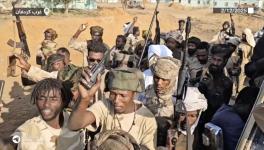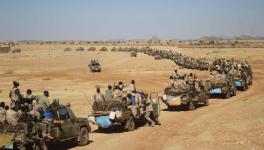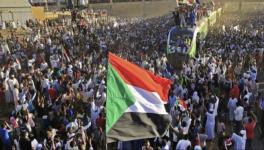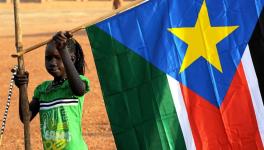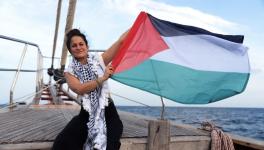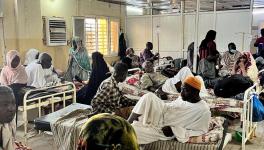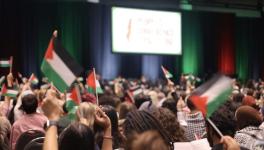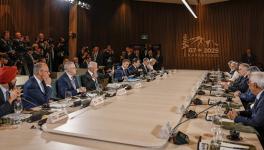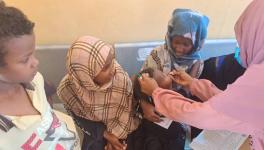Sudanese Protest Against Continuing Atrocities by Rapid Support Forces Militia
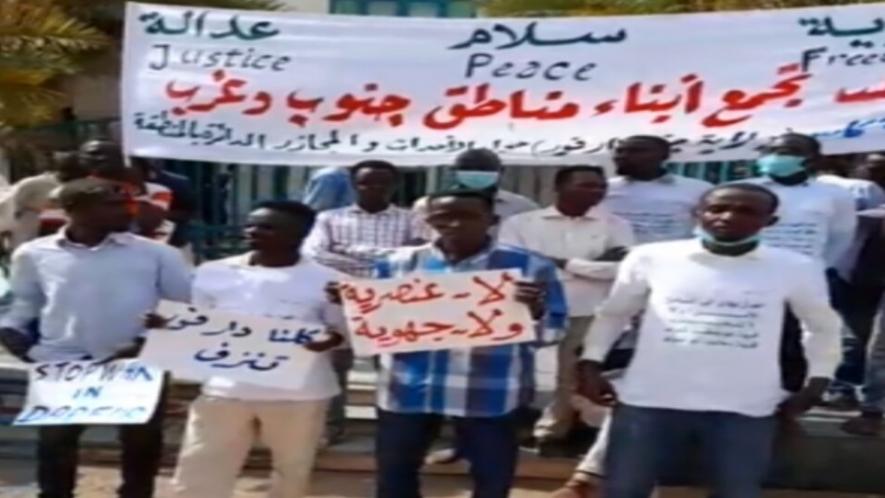
South Darfurians protest in Khartoum on August 10. Credit: Social Media/ Radio Dabanga
On Monday, August 10, residents of Sudanese capital Khartoum who hail from the South Darfur state, held a demonstration outside the offices of the cabinet ministers of the transitional government.
This was in protest against the transitional government’s failure to protect the people of Darfur from attacks by a government militia. These attacks have left dozens dead and thousands displaced in the Darfur region. The notorious militia, the Rapid Support Forces (RSF), is reportedly behind the violence in the South and West Darfur States, as well as separate incidents in the South Kordofan State
In a memorandum to Prime Minister Abdallah Hamdok, the protesters demanded relief for the displaced, and disarmament of the militias. The protesters insisted that peace be restored before the onset of the agricultural season.
Protesters further demand the release of “political prisoners” — mostly civilians who are part of the resistance committees which organized at neighborhood levels. These committees coordinated the mass uprisings which started in December 2018 and culminated in the Sudanese Revolution, leading to the overthrow of dictator Omar al-Bashir in April 2019.
These resistance committee members have allegedly been arrested in a series of crackdowns since July 29 by the RSF. The RSF is a militia primarily comprising Janjaweed Arab tribesmen. Formed during Omar al-Bashir’s rule, it was used to perpetrate genocide in Darfur and other regions where largely non-Arab groups organized against the economic and political discrimination.
It has been deployed alongside the official armed forces and the UN-AU peacekeeping forces to maintain peace in the troubled regions. This paramilitary is alleged to have arrested the civilians, whose release the South Darfurians protesting in Khartoum were demanding.
Two days before Monday’s protest, on August 8, members of the Fallata tribe in South Darfur started a sit-in demonstration in the State’s capital city, Nyala, outside the premises of the Fallatah Shur Council.
The head of this council, the villagers fear, may also be arrested. 35 villagers from the Saadoun area of this State have been arrested and held by the RSF, without any due legal procedure, according to the eyewitnesses who spoke to Sudan Tribune.
Along with their release, these protesters also demanded the withdrawal of RSF from the region and the deployment of regular official police forces. The crackdown on the villages in this State by the RSF escalated after it engaged in a shootout with a group of unidentified gunmen on August 2 in the Boronga village of Kass locality.
This clash left 11 civilians injured with bullet wounds, apart from four RSF members. Protests that followed started peacefully but turned violent when, according to community leaders, “certain infiltrators” set fire to the local police station and government facilities.
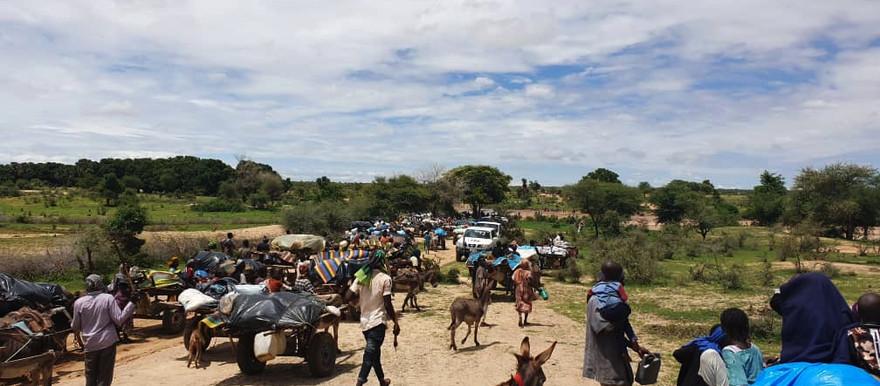
Peacekeepers from the UNAMID Team Site in Kass, South Darfur provide protection to civilians who fled recent attacks (Picture: Unamid)
Fearing retaliation against the entire community by the RSF, at least 3,000 residents of the surrounding villages have fled their homes, seeking refuge in the mountains, said Malik Haroun, a member of the resistance committee in Kass locality.
Violence in West Darfur
Prior to causing this fresh exodus, the RSF had also carried out a series of attacks in the neighboring state of West Darfur, which culminated in the Misterei massacre on July 25, leaving more than 60 dead and many more injured.
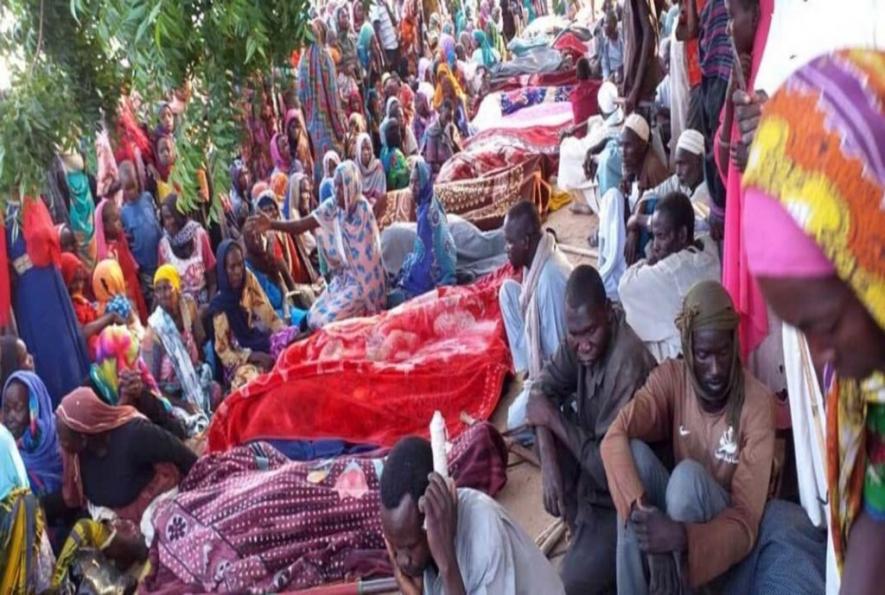
The bodies of victims of the massacre are laid-out for burial (Radio Dabanga)
Misterei is a town in Beida region. Residents, mostly belonging to the Masalit tribe of African ethnicity, had been holding a series of sit-in protests here, demanding the disarmament of RSF.
On July 17, the 11th day of this protest, the governor of the region met the protesters. Radio Dabanga quoted Ammar Ibrahim, member of a resistance committee in the region, as saying “The governor agreed to protect the agricultural season, disarm the militiamen in the region, replace the security committee of the Misteri Administrative Unit, arrest corrupt civil servants affiliated with the former regime, and provide basic services including clean drinking water, electricity, asphalted roads, and better health care in the area.”
Soon after this meeting, alleged RSF gunmen attacked the sit-in site and injured 17, three of whom later died.
The following day, according to Ibrahim, “The militiamen raided the market first. They then stormed the office of the Beida Resistance Committees, the house of the former commissioner, and the Beida Language and Science Institute, and threatened people on the streets. The militiamen managed to control the entire market, as the authorities did not intervene.”
A few days later, July 25, a third of Misterei was burned to the ground, forcing thousands to flee to the state’s capital El Geneina. Many others fled across the border into neighboring Chad.
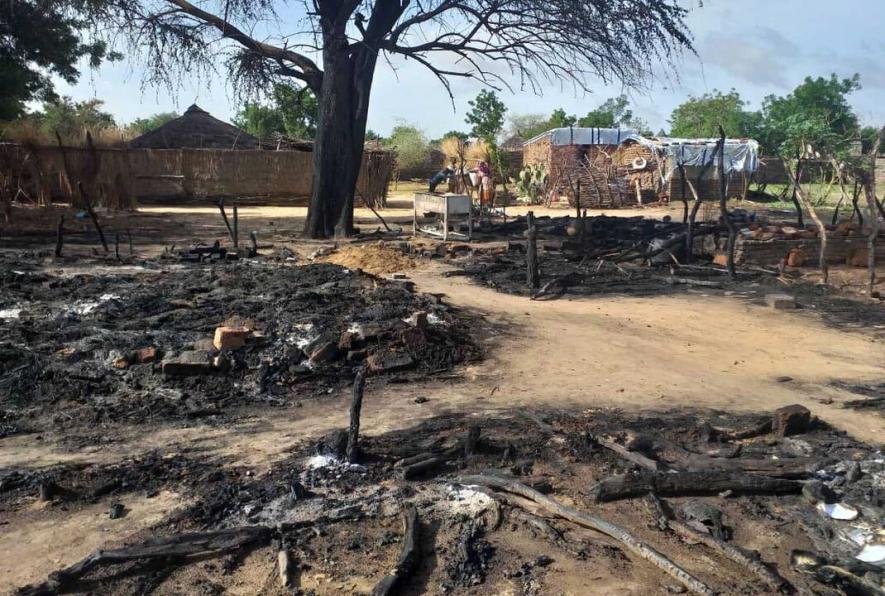
Homes destroyed in the attack (Radio Dabanga)
“The (RSF) militiamen who were wreaking havoc in the area during the reign of Omar al-Bashir are the same men who attacked Misterei and other places in the area,” members of West Darfur’s resistance committees said at the State Building Forum organized by Khartoum University on July 27.
The Darfur Women Action Group (DWAG) said in a statement, “This attack is no short of continued attempts at genocide. The armed men have direct ties to the former regime.. Active members of the Resistance Committees in West Darfur, who have been impacted by the violence, have been warning of escalation for weeks. Armed groups have attacked peaceful sit-ins repeatedly with no response or intervention from authorities.”
The United Nations–African Union Mission in Darfur (UNAMID) voiced concern over the “recent increase in violent attacks on peaceful protestors, civilians, rural communities and camps of internally displaced persons (IDPs) in various localities in North, South and West Darfur.”
The Mission further added that it “welcomes the timely announcement by Prime Minister Dr. Abdalla Hamdok on the deployment of a joint protection force to protect civilians in Darfur.”
This joint force, however, involves the same RSF forces. “The RSF cannot be responsible for protecting the citizens of Darfur, as their members are the ones responsible for committing these atrocities. In order to protect the citizens of Darfur, an independent peacekeeping force must be established in the region,” DWAG said.
It called on the prime minister to “urge the UN for support in establishing a peacekeeping force in Darfur. The prime minister has previously denied the need for UN peacekeepers in the region, but the violence and outcries of the Darfuri people reflect otherwise.”
Campaign for the right to life
This destabilization of the peace process by the RSF has not been limited only to the States in Darfur. On August 7, RSF allegedly attacked the residents of Khor El Waral in Nuba Mountains, in the state of South Kordofan.
One of the armed rebel groups controlling parts of this region, Abdelaziz El Hilu’s faction of Sudan People’s Liberation Movement-North (SPLM-N El Hilu) — which is currently engaged in peace negotiations — said that it “will not hesitate to defend and protect” the civilians in territories it controls.
The rebel group’s Secretary General warned “about the consequences of the transitional government’s biased policies against “non-Arabs” in the southern, eastern, and western parts of the country.”
The same day, activists in Khartoum – composed of those from resistance committees, Darfur Bar Association and from the Association of Relatives of the Victims of the December Revolution – launched a campaign with the slogan “Protect the right to live.”
[T]he increase in violence between social components in Sudan, and the growing number of killings in Darfur, the East, Blue Nile, and the Nuba Mountains,” are the reasons behind launching this campaign, states its founding declaration.
“The government’s failure to do justice to the people in conflict areas means the failure of the transitional period,” it adds. “We are now demanding a minimum, non-negotiable right to live.”
The developments over the past few weeks have led to greater focus on the RSF, which remains one of the most dangerous remnants of the old regime. The RSF is headed by General Mohamed Hamdan Dagalo, better known in Sudan as Hemeti. He holds the position of the Deputy-President of the Sovereignty Council, the highest body of the transitional government. In the aftermath of the Sudanese Revolution and the prolonged negotiation over the future of the country, civilian forces have been constantly demanding the disarmament and dissolution of the RSF. The RSF was also reportedly responsible for attacks on protesters after the overthrow of al-Bashir.
Courtesy: Peoples Dispatch
Get the latest reports & analysis with people's perspective on Protests, movements & deep analytical videos, discussions of the current affairs in your Telegram app. Subscribe to NewsClick's Telegram channel & get Real-Time updates on stories, as they get published on our website.









